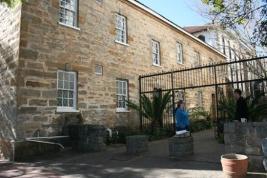Language is involved in and helps to shape most of the things we do as people. This means Linguistics is a multifaceted discipline, which is involved with language in all its forms and functions. It is interested in everything from the individual sounds of language to the ways in which language influences and reflects society. In Rhodes University's Linguistics and Applied Language Studies courses we provide an explicitly South African focus and to use examples from local languages and texts, celebrating our rich and complex multilingual society.
Linguistics will give you insights into how language is structured, how people communicate and use language, how people learn languages and how language changes and develops in society. Training in Linguistics will also be very relevant to your career if you plan to specialise in Education, Journalism, Teaching, Law or Psychology. You don’t need to know many languages to study Linguistics, but you do need a fascination for language.
The programme in Linguistics and Applied Language Studies is designed to meet the needs of anyone involved in language and communication. Its brief can broadly be defined as the exploration of language in its changing context in the light of contemporary linguistic theory.

The Drostdy Barracks, home to the Department of Linguistics and Applied Language Studies
We offer the following postgraduate qualifications:
For more information on our postgraduate offerings, click here.
